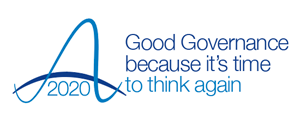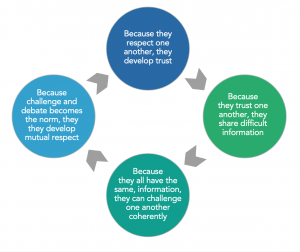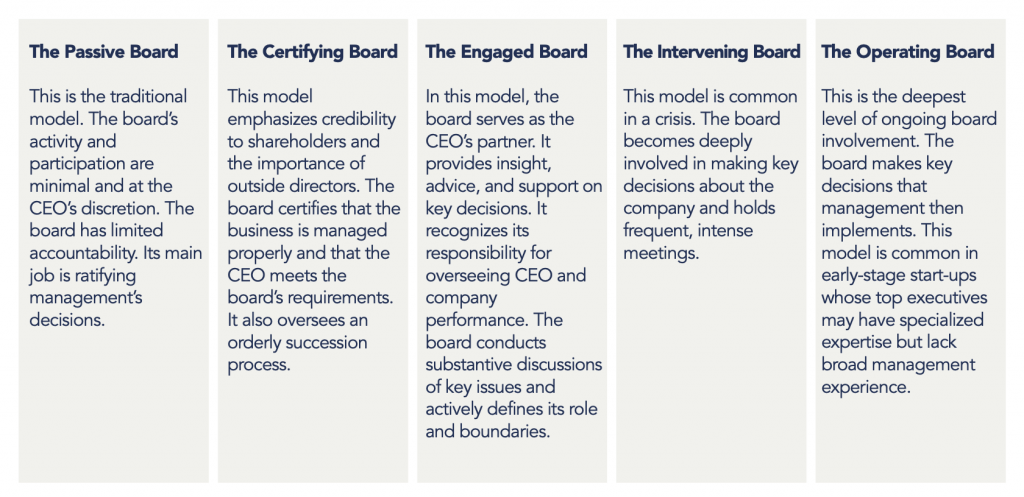Great boards
01 July 2020

During COVID-19 it has been more important than ever that boards be at the top of their game – whether charting a course through the pandemic or providing leadership guidance and support to staff.
A key question we are often asked is what are the key characteristics of successful boards and what mindset and behaviours do boards need to adopt in order to maximise their effectiveness as we move into the recovery phase?
Recipe for an effective board
Much time and research has been devoted to clarifying the hallmarks of effective boards. Some of the more commonly cited indicators include that:
- regular meeting attendance can be considered a barometer for board effectiveness
- board members are more vigilant if they hold significant equity in the company
- audit committees, remuneration committees, and codes of ethics are, in themselves, effective safeguards of good governance
- boards with fewer members are more effective
- boards become less effective as the average age of their members rises.
However, taken in isolation, each of these can be shown to have limited bearing on how effectively a board operates. For example, successful companies have both large (e.g. G.E. and Wal-Mart) and small (e.g. Berkshire Hathaway and Microsoft) boards, while studies have demonstrated that in the majority of instances, age and experience should be considered a key asset for boards.
Accordingly, Jeffrey A Sonnenfeld, a leading academic on board effectiveness, has argued that:
“We need to consider not only how we structure the work of a board but also how we manage the social system a board actually is.”
Writing in the Harvard Business Review (1), Sonnenfeld suggests that it is the behaviours and cultures a board and organisation exhibits that define their success, rather than any specific system or process.
Based on his years of research, Sonnenfeld goes on to argue that high-functioning, successful teams consistently get into a virtuous cycle whereby one good quality builds upon and reinforces another:

This conclusion is something we at GGI have long promoted, believing that good governance is as much about dynamics (relationships, culture, trust etc.) as it is about mechanics (reporting, meetings etc.).
This might seem straightforward and intuitive, but several of the threats to board effectiveness that Sonnenfeld highlights are things we see all too often in our work with NHS and other public sector bodies:
- inconsistent communication
- inadequate information
- a strong focus on the operational at the expense of the strategic
- the emergence or reinforcement of factions
- the prevalence of groupthink
- a lack of defined accountability (with consequences).
Focused board development work is one obvious thing that all boards can do to mitigate these threats. Indeed, taking the work of Sonnenfeld one step further, David A Nadler has argued, also in the Harvard Business Review (2), that:
“The high-performance board, like the high-performance team, is competent, coordinated, collegial, and focused on an unambiguous goal. Such entities do not simply evolve; they must be constructed to an exacting blueprint.”
The key point is that good boards don’t just become good; as with anything in life, the pursuit of excellence takes time, energy and focus.
Interestingly, Nadler proposes that any process of ‘board-building’ must also reflect on the level of engagement that the board will have in the day-to-day running of the enterprise.
Five models are proposed:

We have been asking the boards we’ve been working with to consider which of these models they might fit during COVID-19 and, while there is a general acceptance that boards have adopted different approaches at different times depending on the circumstances, the answers have been illuminating.
For example, the majority of non-executives have reflected that during the first wave they have been relatively passive, recognising the need to allow executive colleagues to ‘get on and deliver’. This is perhaps at odds with Nadler’s model, which suggests boards will typically take an ‘intervening’ position during a crisis. However, as we emerge from the lockdown period, there has been a noticeable shift towards more balanced and engaged boards, in which non-executives again feel they have a more substantial contribution to make.
It is our view that these are the sorts of fundamental questions – around purpose, focus, resource and culture – that boards should be consistently and proactively asking themselves.
How to make your board great
Unfortunately, there is no magic recipe and no quick fix. Boards need to devote time and energy to improving their effectiveness and this also needs to comprise a range of elements: behaviours and culture, systems and processes, as well as a healthy dose of developmental support.
In the emerging new world, we know a lot more will be expected of boards – and they should be clear about how they are going to equip themselves, both to meet the expectations of others and to set their own. The bar has been raised.
Clarity about the collective impact of the board and the way that will be achieved requires time, space and insight about the importance of board development as a core activity. It also requires a practical framework that allows the board to make its own decisions about the type of board it seeks to be and how it intends to get there, with the same level of rigour as it would execute any of its other business.
Over the last decade GGI has developed a range of maturity matrices and other tools that can help boards assess and plan their development. Already these matrices are being revised to keep pace with the changing world and we would welcome more involvement from boards who are actively considering their next steps on the route to greater maturity.
If this bulletin prompts any questions or comments, please call us on 07732 681120 or email advice@good-governance.org.uk
- Sonnenfeld, JA. (2002) 'What Makes Great Boards Great'. Available at: https://hbr.org/2002/09/what-m...
- Nadler, DA. (2002) 'Building Better Boards'. Available at: https://hbr.org/2004/05/buildi...

